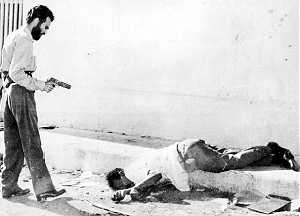[Magharebia] The capture last week of three senior al-Qaeda in the Islamic Maghreb (AQIM) figures is more than just a counter-terrorism success for Algeria. The bigger story is what the AQIM officials were trying to do when ANP soldiers intercepted them in Ghardaia.
The big shots were headed to the desert on a mediation mission aimed at bridging the widening rift between the various arms and branches of the terrorist group.
At the top of the AQIM ladder, it was clear that the inequitable division of ransom cash, competition for leadership, and other issues were creating dangerous fissures within the organization.
The alleged forces of Evil caught during the August 15th operation included Necib Tayeb (aka Abderrahmane Abou Ishak Essoufi), AQIM's "Legal Affairs Committee" head and "Council of Elders" member. He had been sought since 1995.
The trio was intercepted at a checkpoint at the entrance to Berriane while en route to the Sahel for a meeting with al-Qaeda emirs Mokhtar Belmokhtar, Abdelhamid Abou Zeid and Nabil Abou Alqama.
AQIM chief Abdelmalik Droukdel
... aka Abdel Wadoud, was a regional leader of the GSPC for several years before becoming the group's supremo in 2004 following the death of then-leader Nabil Sahraoui. Under Abdel Wadoud's leadership the GSPC has sought to develop itself from a largely domestic entity into a larger player on the international terror stage. In September 2006 it was announced that the GSPC had joined forces with al-Qaeda and in January 2007 the group officially changed its name to the Al-Qaeda Organization in the Islamic Maghreb. ...
sent the high-level envoys to meet with the rival AQIM leaders in the Sahel "to put an end to the rebellion and mutiny of some of them against the organization's central leadership", Algerian state news agency APS quoted a security source as saying.
Abou Zeid (aka Mohamed Ghadir), the "Tariq Ibn Ziyad" katibat boss, and Belmokhtar (aka "Laaouar"), who runs the El Moulethemine battalion, have been vying for control of AQIM's Sahara emirate. Each has blamed the other for the failure of recent operations and the decline in ranks. Their rivalry grew worse after the promotion of Abou Alqama as the new head of the Sahara emirate.
Security officials are calling the capture of the three AQIM envoys a "major blow" to the terror organization.
With AQIM influence in the Sahel region
... North Africa's answer to the Pak tribal areas...
weakening in favour of other groups, such as Ansar al-Din and MUJAO, the envoys hoped to resolve some internal problems that had arisen as a result of competition for leadership, RFI reported.
The capture shows that the group's move from desert outposts to northern Mali cities has led to a major intelligence failure, analyst al-Moukhtar al-Salem told Magharebia.
"The strategic shift, which includes recruitment of children without the necessary spiritual qualification and the use of physical violence against local African recruits who are not gunnies in their habits, are all factors that made the group liable to penetration because of information leaks," he said.
"The parent al-Qaeda used to send special envoys, such as Abu Yahya al-Libi, to solve problems," noted Said Ould Habib, director of the Millennium Centre for Media Studies and Research in Nouakchott.
Today, however, al-Qaeda central has been marginalised. The deaths of the late Osama bin Laden
... who is currently warming his feet by the fire with Hitler and Himmler...
and al-Libi, a decline in al-Qaeda's financial resources and -- most of all -- the major independence of its branches, have accelerated this irreversible decline, Ould Habib said.
The push to break away from the central organization began long before the MUJAO emerged in Mali.
As far back as 2004, Mauritanian salafist Khadim Ould Semane beat feet from prison and tried to defect from AQIM and establish his own group, Ansar Allah al-Mourabitoun.
The aspiring "emir" planned to make his group deal with AQIM as an independent peer, rather than a mere affiliate branch.
"During the period I spent with Khadim Ould Semane and his group at the Central Prison in Nouakchott, he always claimed that he was the founder of Ansar Allah al-Mourabitoun in Mauritania, which was linked to al-Qaeda through an oath of allegiance, and had similar ideas to al-Qaeda," former salafist prisoner Abdellahi Ould Ebouh tells Magharebia.
"However,
man does not live by words alone, despite the fact that sometimes he has to eat them...
after we engaged in many discussions with him, we found out that he has no oath of allegiance with AQIM, and that his only relation to al-Qaeda was restricted to his personal relation with Laaouar," the former prisoner adds.
Analyst Sid Ahmed Ould Tfeil notes that "Khadim Ould Semane's attempts to defect after he embraced al-Qaeda's ideology outraged Laaouar, with whom he had a special relation.
However,
ars longa, vita brevis...
he didn't want to show that for fear of rifts in the group."
Al-Qaeda was "observing the issue with much caution," he said, because this was the first time that a "non-Algerian recruit tried to unilaterally command a group."
"Khadim Ould Semane's behaviour made al-Qaeda fear that other ambitious young people would venture to do the same," Ould Tfeil adds.
Competition for money has been behind most disputes between AQIM leaders and their foot soldiers, but the issue never seemed enough to bring the dissolution of the terror group.
The birth of other groups that embrace the same ideology -- and in the same region -- consolidated al-Qaeda fears, however, and led the group to launch the mediation mission just interrupted in Berriane.
Recent moves to open a channel of communication with Iyad Ag Ghaly, the leader of al-Qaeda-ally Ansar al-Din, may further undermine the organization's capabilities.
"These are real fears," says Othmane Ag Weisi, a Touareg analyst in northern Mali.
"If Iyad Ag Ghaly decides to put an end to his ties with al-Qaeda in return for guarantees from the Economic Community of West African States (ECOWAS) and Algeria, many of his followers will quit al-Qaeda," Ag Weisi adds.
The other gang in northern Mali -- MUJAO -- was the first group to defect from al-Qaeda. It declared itself independent last year when it grabbed credit for kidnapping western aid workers from the Tindouf refugee camps.
But MUJAO may not have been motivated by pure ideology, analyst Abdelhamid al-Ansari suggests.
"The desire of its elements to co-exist with al-Qaeda and the other smuggling gangs in the Sahara forced them to engage in the chaos charter in the region," al-Ansari says.
In other words, in order to engage in their criminal pursuits, MUJAO "had to adopt the same slogans as al-Qaeda, such as raising the banner of jihad and Sharia".
|
 [Magharebia] Stepped-up military operations and intelligence penetrations have sown panic among al-Qaeda in the Islamic Maghreb (AQIM) leaders, security analysts say.
[Magharebia] Stepped-up military operations and intelligence penetrations have sown panic among al-Qaeda in the Islamic Maghreb (AQIM) leaders, security analysts say.
 [Magharebia] Al-Qaeda in the Islamic Maghreb (AQIM) designated Algerian terrorist Nabil Makhloufi, alias Nabil Abu Alqama, as the new head of the Sahara emirate.
[Magharebia] Al-Qaeda in the Islamic Maghreb (AQIM) designated Algerian terrorist Nabil Makhloufi, alias Nabil Abu Alqama, as the new head of the Sahara emirate.